

État, utopie et justice sociale : de Thomas More à Ruwen Ogien. Par Thierry Guinhut.
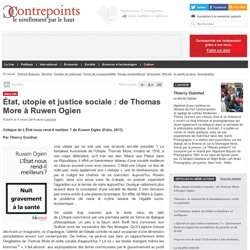
Une utopie qui ne soit pas une tyrannie est-elle possible ? Les racines utopiques du nazisme. Dans Crime et utopie, Frédéric Rouvillois tente de déceler ce que le national-socialisme doit aux théories millénaristes.
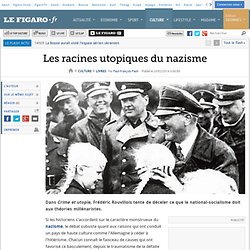
Si les historiens s'accordent sur le caractère monstrueux du nazisme, le débat subsiste quant aux raisons qui ont conduit un pays de haute culture comme l'Allemagne à céder à l'hitlérisme. Tudor terror: John Guy is on a mission to bring history to the masses - Features - Books. It is the summer of 1535, just weeks after the execution of Sir Thomas More.
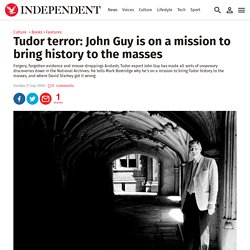
A small rowing boat makes its way along the Thames from Chelsea to London Bridge. The oarsman's passengers are a 29-year-old gentlewoman, Margaret Roper, and her maid, who carries a basket. A horrific sight meets their eyes as they approach the bridge: a dozen or more skulls on poles protruding from the parapet, which have been boiled and tarred to prevent them being fed upon by circling gulls. As new heads arrive, the old ones are moved along the row until they reach the end of the line, when they are thrown into the river. At the door of the north tower of the bridge, the maid negotiates with the bridge-master, handing over the contents of her purse.
The English Reformation: St. Thomas More and Torture. Wolf Hall , the first volume in Hilary Mantel's trilogy of novels about Thomas Cromwell casts St.
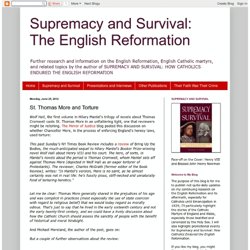
Thomas More in an unflattering light, one that reviewers might be relishing. The Mirror of Justice blog posted this discussion on whether Chancellor More, in the process of enforcing England's heresy laws, used torture: This past Sunday's NY Times Book Review includes a review of Bring Up the Bodies , the much-anticipated sequel to Hilary Mantel's Booker Prize-winning novel Wolf Hall about Henry VIII and his court. The hero, of sorts, in Mantel's novels about the period is Thomas Cromwell, whom Mantel sets off against Thomas More (depicted in Wolf Hall as an eager torturer of Protestants).
The reviewer, Charles McGrath (former editor of the Book Review ), writes: "In Mantel’s version, More is no saint, as he almost certainly was not in real life: he’s fussily pious, stiff-necked and unnaturally fond of torturing heretics. " And Michael Moreland, the author of the post, goes on: 1. 2. Thomas More Was Not "Unnaturally Fond of Torturing Heretics" « Garvey on the mandate and church-state separation | Main | Religious Freedom Debate in North Dakota » May 29, 2012 Thomas More Was Not "Unnaturally Fond of Torturing Heretics" This past Sunday's NY Times Book Review includes a review of Bring Up the Bodies, the much-anticipated sequel to Hilary Mantel's Booker Prize-winning novel Wolf Hall about Henry VIII and his court.
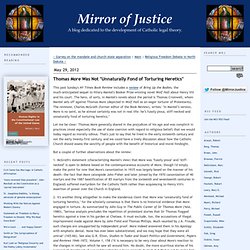
Thomas More. Pope Pius XI canonised More in 1935 as a martyr of the schism that separated the Church of England from Rome; Pope John Paul II in 2000 declared More the "heavenly Patron of Statesmen and Politicians".[4] Since 1980, the Church of England has remembered More liturgically as a Reformation martyr.[5] In 2002, he was placed at number 37 in the BBC's poll of the 100 Greatest Britons.[6] Early life[edit] More began his studies at Oxford in 1492, and received a classical education.
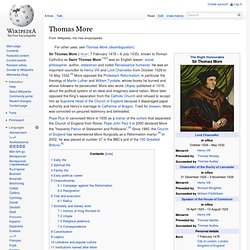
Studying under Thomas Linacre and William Grocyn, he became proficient in both Greek and Latin. More left Oxford after only two years—at his father's insistence—to begin legal training in London at New Inn, one of the Inns of Chancery.[9]:xvii[11] In 1496, More became a student at Lincoln's Inn, one of the Inns of Court, where he remained until 1502, when he was called to the Bar.[9]:xvii Spiritual life[edit] Family life[edit] More's decision to educate his daughters set an example for other noble families.
Richard Marius. Richard Curry Marius (July 29, 1933–November 5, 1999) was an American academic and writer.
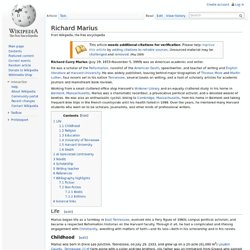
He was a scholar of the Reformation , novelist of the American South , speechwriter, and teacher of writing and English literature at Harvard University . He was widely published, leaving behind major biographies of Thomas More and Martin Luther , four novels set in his native Tennessee , several books on writing, and a host of scholarly articles for academic journals and mainstream book reviews. Working from a small cluttered office atop Harvard's Widener Library and an equally cluttered study in his home in Belmont, Massachusetts , Marius was a charismatic raconteur, a provocative political activist, and a devoted wearer of bowties. He was also an enthusiastic cyclist, biking to Cambridge, Massachusetts , from his home in Belmont and taking frequent bike trips in the French countryside until his health failed in 1998.
Life [ edit ] Childhood [ edit ] Religion [ edit ] Education [ edit ] Histoire du christianisme - Thomas More, le souci de la cohérence morale, 1/2. CLR FORUM. Thomas More. Du martyre en politique (à propos de saint Thomas More) J’ai déjà abordé ici la passion du saint Patron de ce blog il y a deux ans.
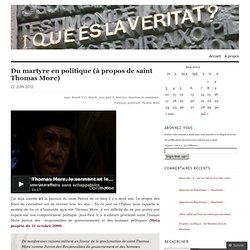
Le propre des fêtes du calendrier est de revenir tous les ans… En ce jour où l’Eglise nous rappelle le modèle de foi et d’humanité qu’a été Thomas More, il est difficile de ne pas porter son regard sur son comportement politique. Jean-Paul II a d’ailleurs proclamé saint Thomas More patron des responsables de gouvernements et des hommes politiques (Motu proprio du 31 octobre 2000) :
Oeuvres de Thomas More. Prelude - Garrett Fisher. Amici Thomae Mori: Saint Thomas More. En souriant... Thomas More, Préface de L'Utopie. Motu Proprio pour la proclamation de Saint Thomas More - Jean-Paul II (31 octobre 2000) 1.
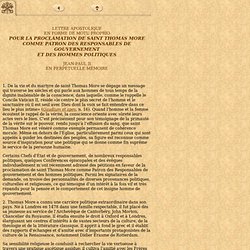
De la vie et du martyre de saint Thomas More se dégage un message qui traverse les siècles et qui parle aux hommes de tous temps de la dignité inaliénable de la conscience, dans laquelle, comme le rappelle le Concile Vatican II, réside «le centre le plus secret de l’homme et le sanctuaire où il est seul avec Dieu dont la voix se fait entendre dans ce lieu le plus intime» (Gaudium et spes, n. 16). Quand l’homme et la femme écoutent le rappel de la vérité, la conscience oriente avec sûreté leurs actes vers le bien. Saints John Fisher and Thomas More... 102124 - Saint Thomas More (1478 - 1535) / De S à Z / Chroniques des Saints / Chroniques. Rencontre avec le Parlement et la « British Society », 17 septembre 2010, Benoît XVI. Westminster Hall - City of Westminster Vendredi 17 septembre 2010 (Vidéo) Monsieur le Speaker, Je vous remercie des paroles de bienvenue que vous venez de m’adresser au nom des membres distingués de cette assemblée.
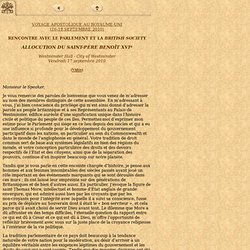
En m’adressant à vous, j’ai bien conscience du privilège qui m’est ainsi donné d’adresser la parole au peuple britannique et à ses Représentants au Palais de Westminster, édifice auréolé d’une signification unique dans l’histoire civile et politique du peuple de ces Iles. Permettez-moi d’exprimer mon estime pour le Parlement qui siège en ce lieu depuis des siècles et qui a eu une influence si profonde pour le développement du gouvernement participatif dans les nations, en particulier au sein du Commonwealth et dans le monde de l’anglophonie en général.
The Trial of Sir Thomas More: A collection of images, primary documents, trial reports, maps, and other materials relating to More's 1535 trial and execution. A Man for All Seasons - Trial (3 of 3) The Execution of Thomas More. The Trial and Execution of Sir Thomas More. The Trial of Sir THOMAS MORE Knight, Lord Chancellor of England, for High- Treason in denying; the King's Supremacy, May 7, 1535. the 26th of Henry VIII. Thomas More's daughter, Margaret Roper, rescuing More's head Bill being preferred in Parliament, November 1534. to attaint Elizabeth Barton, and several others of High-Treason, Bishiop Fisher and Sir Thomas Moore were also brought into it for Misprision of Treason, for the refusing of the Oath of Succession— Says my Lord Herbert. The fame Author avows the Bill did so pass; but Sir Thomas's Great-Grandson, in his Life, shews the contrary, and that notwithstanding the Archbishop of Canterbury, the Lord Chancellor, Duke of Norfolk, and Secretary Cromwell, by the King's Command, went to him and pressed him to a Compliance; yet the Chancellor influenced the King so far, that the matter of Misprison was dropt.
Barreau anglais ou choix de ... Our human rights culture has now become a tyranny. 090319 - Saint Thomas Becket (1117 - 1170) / De S à Z / Chroniques des Saints / Chroniques. Thomas Becket, martyr de la politique, assassiné par quatre chevaliers du roi le 29 décembre 1170. L'archevêque (dans la pièce d'Anouilh) : " Mon prince, je voudrais tant pouvoir t'aider... " Amici Thomae Mori: Saint Thomas More.